10 Benefits of Learning Coding for Kids | Codeyoung
10 Benefits of Learning Coding for Kids | Codeyoung
Even beyond the advancement of tech and the number of job opportunities, coding helps develop a few crucial skills, which are the benefits of learning coding programming languages at a young age. As a young kid still forming their perception of the world, it is easier to grasp new things. Exposing them to different views from people and teaching them to work collectively will help them become better team players.
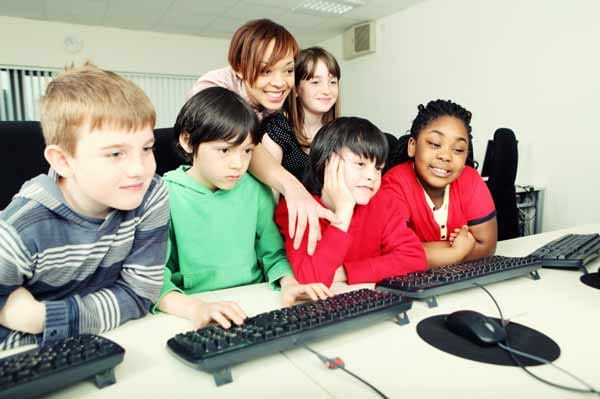
Why Learning to Code Early Can Shape a Bright Future?
Learning to code at a young age introduces young brains to the basics of programming while developing creativity and problem-solving abilities. As children learn coding for beginners, they get the tools they need to succeed in a technologically driven future, setting the road for success.
1) Children develop cognitive skills
Coding for kids helps them learn a logical, problem-solving approach that is similar to that of a computer as they learn to read and write code. Because computational thinking is a mode of thinking that solves practical issues, it may be applied to circumstances other than coding.
For those new to programming, coding for kids can also serve as an excellent foundation to learn coding for beginners, introducing essential skills in an engaging and approachable way.
2) To improve the child's communication skills

Learning code is like learning a new language. While it isn't Spanish or Italian, learning to code requires some of the same skills as learning to program a new language. We become better communicators when we learn a new language. We must be able to break things down into simple terms. This is also true when it comes to the benefits of learning coding.
3) Children learn to solve difficulties
Learning Coding for kids allows us to break down big problems into smaller parts. This problem-solving method can be used in a variety of fields. Scientists, for example, address difficulties by formulating hypotheses and testing them one by one. A programmer debugs an issue by creating intelligent hypotheses and altering pieces of his code one at a time to see which one solves the problem.
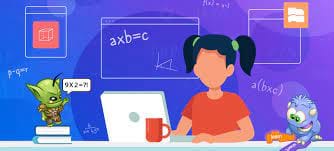
4) Enhance Mathematical Skills
Algorithmic thinking is the capacity to establish explicit stages for addressing a problem or completing a task. Repetition, sequencing, and conditional logic are some of the computing ideas involved. Kids utilise algorithms, even if they aren't aware of them, particularly in arithmetic (such as when doing long division problems) and science. Algorithmic thinking enables children to deconstruct issues and consider solutions step-by-step.
5) Kids develop tenacity
Children learn to keep trying even if what they're making doesn't work. They feel obligated to discover what isn't working, why it isn't functioning, and how to fix it until it does. While solving a problem, coders need to go back and forth with their ideas to arrive at a solution. This helps them hone the art of persistence while seeking different ways to reach the answer.
6) Dedication And Zest To Learn Coding For Beginners
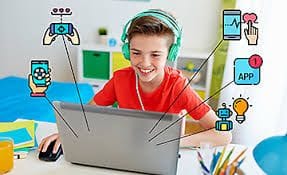
Learning programming for beginners can help your child discover a lifelong passion and help him choose a future job. With the advancement of artificial intelligence, machine learning, data mining, and robotics, computer learning could be one of the fastest-growing and most intriguing professions in the next few decades. Children introduced to code acquire a liking, if not a passion, for it and discover that it is what they want to do with their lives.
7) Future opportunity
Learning coding can produce many monetary opportunities for creative and entrepreneurial coders. Several accounts exist of youthful coders who used their ideas to create software, apps, games, and websites that allowed them to become wealthy at a young age. There are numerous accounts of young app developers becoming millionaires. Many teenagers who sell their coding and web design skills online can accumulate enough money for college.
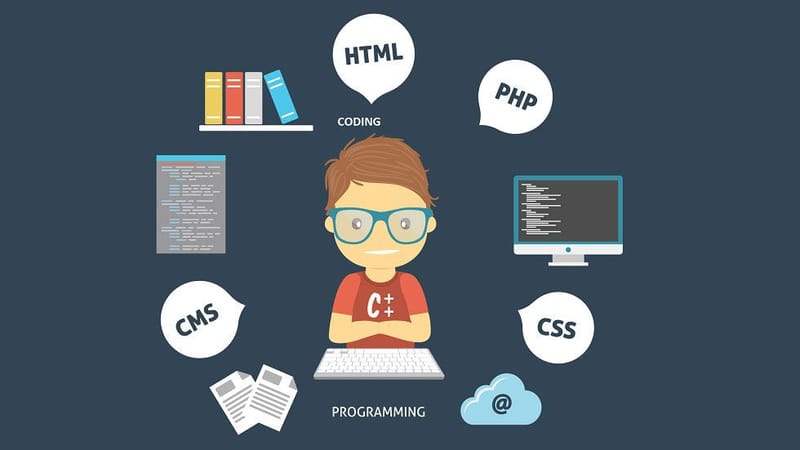
A report by the Guardian said that “400m to 800m jobs are predicted to be lost to technology by 2030.” The article also stresses the developments in artificial intelligence, robotics, and automation, causing a significant shift in people's efforts to upskill themselves. The same report also notes that the number of coders worldwide will rise to almost 28 million by 2023.
With the industry becoming more tech-friendly, mundane tasks are being automated, increasing the demand for coders. Learn coding for beginners will help kids grow up with technology, preparing them for the future.
8) Coding boosts self-assurance.
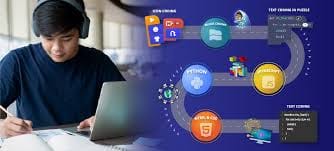
Parents who have sent their children to a FunTech learning coding online class or course frequently say that their children's confidence and communication have improved. This can be attributed to the fundamentals of learning new things outside their comfort zone. When learning coding in a peer group, kids are exposed to different ideas. They get a chance to look at problems differently and arrive at a solution that is best viable to the problem. This helps them build their skills and ability to think through obstacles. At the same time, they have to present their idea to others clearly. This helps them articulate their thoughts and ideas better and, at the same time, helps them think from a different person’s perspective.
9) Coding aids in the development of core soft skills
As your youngster learns to code, they will encounter increasingly tricky processes and issues. As they write more complex code, they should naturally enhance their focus and organisational abilities. Coding for beginners can also aid in developing their resilience and communication skills.
10) Coding Encourages Hands-On Learning For Programming For Beginners
It's a hands-on approach to learning in which pupils adapt and learn by interacting with their surroundings. The premise behind learning by doing is that we learn better when we really "do" something. The kid will grasp the software they are using to play the game if they learn by doing. Later on, students learn more about how items move, how many points they may get, and so on. It is an active practice rather than a passive one. Active engagement helps children learn more deeply and encourages them to make mistakes.
Coding helps kids understand the concepts taught in science and math classes better. It gives them the chance to apply all the concepts in real life. Such languages make the learning process easy and reduce the pain points for kids. Once the kid gets comfortable with the coding language, they can proceed to more complex languages. This step-by-step transition makes it easier for kids to adapt to the different types of programming languages rather than exposing them to them all at once.
With NEP 2020 in place, coding will be taught in schools. This move is in light of potential advancements in the changing job industry and makes the kids future-ready
Conclusion
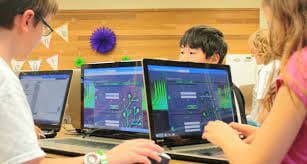
Several learning coding communities bring together beginners and experts to share their progress, projects, and lessons. Such communities help kids learn from different people, share their views, and nurture their interest in coding.
Enrolling children in online programming for beginners has many benefits. It is crucial to understand their interests and pick from various online courses for kids that best suit their needs. Even if they do not pursue coding as their career path, taking up a few coding classes will help them gain the right skills for the future.Visit Codeyoung to learn more!
Codeyoung is one of the best coding apps that provides programming for beginners because it offers an interactive learning environment.
Every student is validated by India's most prominent institute, TOSC IIT Kanpur Student Certification.
You get unlimited access to the Learning Platform for the rest of your life. You can access the courses and recordings anytime and from any location.
Access to our coding experience platform at a discounted rate
Peer-to-peer learning is extensively stressed. Collaborate with your classmates, make friends with them, and gain knowledge from them.
High-quality, well-versed mentors are available.
Mentors in the top 1% who are patient and capable of teaching children
The student Portfolio has a lot of information that may be customized.
Codeyoung is one of the best platforms to learn Scratch! Your youngster will learn to code using Scratch with the help of our skilled educators. Scratch is a well-known application that allows you to:
- To conduct coding and programming activities, it uses a drag-and-drop interface.
- Allows your youngster to work on projects with other kids.
- Games, animations, stories, and music are examples of coding tasks.
- Aids children develop imaginative solutions to challenges and express their thoughts.
Programming For Beginners- FAQs
What is coding used for?
Learning coding enables us to develop computer software, websites, apps, video games, operating systems, etc. Because of lines of code, the backdrop on this page is the way it is. For mobile devices, mobile developers create new applications or adapt existing websites. Mobile developers write code that transfers websites and apps to mobile devices without losing their appearance or functionality. A programmer creates instructions that describe the data and tasks required to create a visual or complete a task.
How to learn to code?
Researching all the various programming languages and studying their basics is the best way to learn to code. Then, watch their videos to determine where your interests lie and how your skills relate. Before you begin any task, develop a study strategy for yourself. Numerous online platforms and websites are available for coding for kids; one of the best ones is Codeyoung!
How to learn to code for beginners?
Learning to code at a young age allows kids to better understand the world around them. Coding enables students to visualise abstract concepts, apply arithmetic to real-life circumstances, and understand the STEM curriculum more easily. As a young kid still forming their perception of the world, it is easier to grasp new things. Exposing them to different views from people and teaching them to work collectively will help them become better team players.
What are the advantages of coding?
Coding is already a significant element of this technological progress and will become even more so when new robotics and automated technologies emerge. A few benefits of learning programming languages can also provide you with numerous options in more creative industries. Even beyond the advancement of tech and the number of job opportunities, coding helps develop a few crucial skills at a young age. Coding for beginners can help engage kids' brain learning centres. It can help kids strengthen their problem-solving abilities and cognitive abilities.
Why is it important to learn to code?
When a child is learning to code, they will frequently discover that there are multiple solutions to a problem. Also, coding for beginners makes a kid think 'out of the box. It enhances their creativity and imagination. It promotes critical thinking and focuses on assisting students in developing and implementing problem-solving skills. Because it's "cross-disciplinary," it's a good idea to start teaching it coding in elementary or even preschool.
Comments
Your comment has been submitted